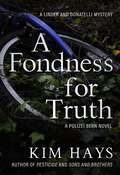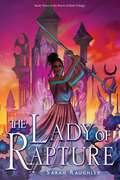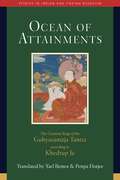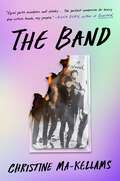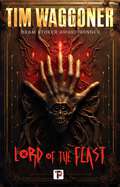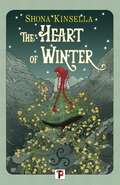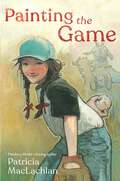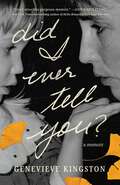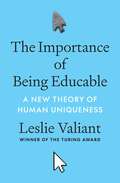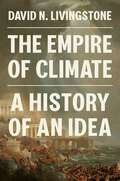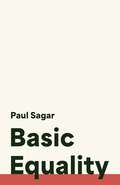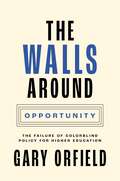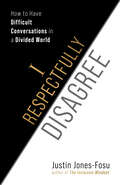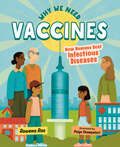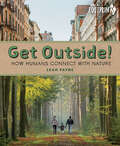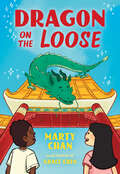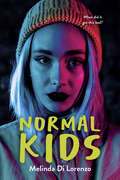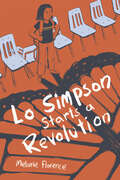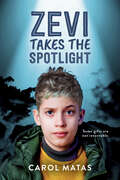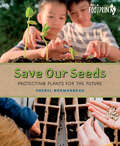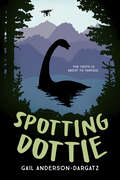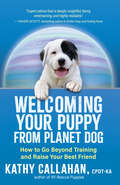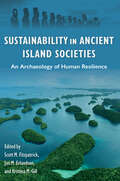- Table View
- List View
A Fondness for Truth (A Linder and Donatelli Mystery #3)
by Kim HaysHonesty isn't always the best policy in Kim Hays' third Linder and Donatelli Mystery novel . . .Andi Eberhart is riding her bicycle home on an icy winter night when she is killed in a hit-and-run. Her devastated partner, Nisha, is convinced the death was no accident. Andi had been receiving homophobic hate mail for several years, and the letters grew uglier after the couple&’s baby was born. Bern homicide Detective Giuliana Linder is assigned to investigate what happened to Andi. As she pieces together the details of Andi and Nisha&’s lives, her assistant Renzo Donatelli looks into Andi&’s job advising young men drafted into Switzerland&’s civilian service. Working closely together, Giuliana and Renzo are again tempted to become more than just friendly colleagues. As both detectives dig into Andi&’s life, one thing becomes clear: Andi&’s friends and family may have loved her for her honesty, but her outspokenness threatened others—perhaps enough to get rid of her.
The Lady of Rapture (Bones of Ruin Trilogy #3)
by Sarah RaughleyPenny Dreadful meets The Gilded Wolves in this breathtaking finale to the young adult historical fantasy Bones of Ruin trilogy!For years, the elite secret society called the Enlightenment Committee has waited for the apocalyptic force known as Hiva to destroy the world as it has so many times before. What the Committee didn&’t know, however, was that Hiva wasn&’t an event—it was a person. Iris Marlow. An African tightrope dancer with no memories of her past. A girl who cannot die. At least, she couldn&’t die. Until her own friends discovered her one weakness and murdered her once and for all. The world-ending threat she posed should be gone too, but there&’s one more Hiva out there, and unlike Iris, this one has no love for humanity. In her absence, this Hiva has taken it upon himself to judge if humanity deserves to live. But when it comes to Hivas, the judgment is always the same. The ending is always total destruction. And while Iris is dead, she&’s not gone—and after the betrayal that ended her life as Iris, she is now out for revenge. The world&’s days are numbered. The Cataclysm has begun.
Ocean of Attainments: The Creation Stage of Guhyasamaja Tantra According to Khedrup Jé
by Yael Bentor and Penpa DorjeeThis commentary on Guhyasamaja tantra is the seminal guide to deity yoga and tantric visualization for the Geluk school of Tibetan Buddhism.Ocean of Attainments was composed by Khedrup Jé Gelek Palsang (1385–1438), one of Tsongkhapa Losang Drakpa&’s most prominent disciples. Its subject is the creation stage, a quintessential Buddhist tantric meditation that together with the completion stage comprises the path of unexcelled tantra. The Guhyasamaja Tantra, referred to as the &“king of all tantras,&” is revered in Tibet, especially by the Geluk school, for its hermeneutic methods, which are in turn applied to other tantras. In the creation stage, meditators visualize themselves as buddhas at the center of the celestial mandala, surrounded in all directions by male and female bodhisattvas and enlightened beings. Since the core of the practice is visualization, this meditation—perhaps more than other meditations—presumes the creative power of the mind. Visualizations form the basis not only of the creation stage and deity yoga but of all tantric practices and rituals, since tantric practice takes place not in mundane existence but in the illusion-like purity of the enlightened view. While the previously published Essence of the Ocean of Attainments is a concise exposition on the practice of the Guhyasamaja sadhana, Ocean of Attainments is much more detailed, providing extensive scriptural citations, clear explanation of the body mandala, arguments on points of contention, reference to other tantric systems, and critiques of misinterpretations. Complemented by the extensive and clear introduction, this volume is a vital contribution to the growing body of scholarship on Guhyasamaja and on Buddhist tantra in general.
The Band: A Novel
by Christine Ma-Kellams&“This could very well be the first great K-Pop literary phenomenon.&” —Debutiful, Most Anticipated Books of 2024 Perfect for fans of Mouth to Mouth and Black Buck, this whip-smart, darkly funny, and biting debut follows a psychologist with a savior complex who offers shelter to a recently cancelled K-pop idol on the run. Sang Duri is the eldest member and &“visual&” of a Korean boy band at the apex of global superstardom. But when his latest solo single accidentally leads to controversy, he&’s abruptly cancelled. To spare the band from fallout with obsessive fans and overbearing management, Duri disappears from the public eye by hiding out in the McMansion of a Chinese American woman he meets in a Los Angeles H-Mart. But his rescuer is both unhappily married with children and a psychologist with a savior complex, a combination that makes their potential union both seductive and incredibly problematic. Meanwhile, Duri&’s cancellation catapults not only a series of repressed memories from his music producer&’s earlier years about the original girl group whose tragic disbanding preceded his current success, but also a spiral of violent interactions that culminates in an award show event with reverberations that forever change the fates of both the band members and the music industry. In its indicting portrayal of mental health and public obsession, fandom, and cancel culture, The Band considers the many ways in which love and celebrity can devolve into something far more sinister when their demands are unmet.
Lord of the Feast
by Tim WaggonerReaders of Clive Barker&’s The Great and Secret Show, Laird Barron&’s The Croning or Steve Rasnic Tem&’s Blood Kin will love this new Tim Waggoner chillerTwenty years ago, a cult attempted to create their own god: The Lord of the Feast. The god was a horrible, misbegotten thing, however, and the cultists killed the creature before it could come into its full power. The cultists trapped the pieces of their god inside mystic nightstones then went their separate ways. Now Kate, one of the cultists&’ children, seeks out her long-lost relatives, hoping to learn the truth of what really happened on that fateful night. Unknown to Kate, her cousin Ethan is following her, hoping she&’ll lead him to the nightstones so that he might resurrect the Lord of the Feast – and this time, Ethan plans to do the job right.FLAME TREE PRESS is the imprint of long-standing independent Flame Tree Publishing, dedicated to full-length original fiction in the horror and suspense, science fiction and fantasy. The list brings together fantastic new authors and the more established; the award winners, and exciting, original voices. Learn more about Flame Tree Press at www.flametreepress.com and connect on social media @FlameTreePress
The Heart of Winter
by Shona KinsellaReaders of Sistersong by Lucy Holland, Cast Long Shadows by Cat Hellisen and The Pendragon Cycle by Stephen Lawhead wil love this fantasy tale of folklore and myth from Scotland.When Brigit is faced with a forced marriage to Aengus, god of Summer, she flees into the highlands in search of the Cailleach, the Queen of Winter. There, she hopes to learn how to live on her own terms, without the need for a man to speak for her, but can she persuade the Cailleach that she is worthy? Caught between two gods and finding an unlikely ally in the Fae witch, Nicnevin, Brigit will be tested to her limits and beyond.FLAME TREE PRESS is the imprint of long-standing Independent Flame Tree Publishing, dedicated to full-length original fiction in the horror and suspense, science fiction & fantasy, and crime / mystery / thriller categories. The list brings together fantastic new authors and the more established; the award winners, and exciting, original voices. Learn more about Flame Tree Press at www.flametreepress.com and connect on social media @FlameTreePress
Painting the Game
by Patricia MacLachlanIn this final middle grade novel by Newbery Award–winning author Patricia MacLachlan, a young girl tries to untangle her love of baseball from her complicated relationship with her professional pitcher father.Lucy&’s father is a minor league baseball player, a professional pitcher hoping to get called up to the majors, and Lucy inherited his passion for the game. But she&’s never played pitcher. She worries her skills would be compared to her dad&’s and she&’d never measure up. And his pitching may mean big things for his career and their family, but it&’s also what keeps him away from home so much of the year. Sometimes, Lucy isn&’t sure what would be worse: being bad at pitching or being great. Still, this summer, Lucy wants to learn to throw the perfect knuckleball. She wakes up at the crack of dawn to practice in secret, without her friends Tex and Robin—or even the goats who watch them play. Even as she trains relentlessly, Lucy wonders if she&’ll ever feel brave enough to share her progress with her mom or dad. Can she prove to them, and herself, that she has what it takes?
Did I Ever Tell You?: A Memoir
by Genevieve KingstonTHE MOST EXTRAORDINARY, LIFE-AFFIRMING MEMOIR YOU WILL EVER READ ABOUT THE POWER OF LOVE.Did I Ever Tell You? reads like a novel but is an unforgettable true story. Genevieve (Gwen) Kingston was just eleven years old when her mother passed away, leaving behind a chest filled with gifts and letters to celebrate the milestones of Gwen&’s life and each of her birthdays until age thirty. When Did I Ever Tell You? opens, just three packages remain: engagement, marriage, and first baby. Tracing Gwen&’s coming-of-age, the book reveals a treasure hunt, with each gift and letter unveiling more about her mother, her family, and—ultimately—herself. Like Crying in H Mart by Michelle Zauner and The Last Lecture by Randy Pausch, Did I Ever Tell You? is a riveting book filled with unexpected twists and powerful life lessons. Through her mother&’s fierce and courageous love, Gwen was granted the tools not only to move through grief but to cherish life. For as her mother says in one of her letters: &“love is stronger than death.&”
The Importance of Being Educable: A New Theory of Human Uniqueness
by Leslie ValiantIn the age of AI, why our future depends on better understanding what makes us humanWe are at a crossroads in history. If we hope to share our planet successfully with one another and the AI systems we are creating, we must reflect on who we are, how we got here, and where we are heading. The Importance of Being Educable puts forward a provocative new exploration of the extraordinary facility of humans to absorb and apply knowledge. The remarkable &“educability&” of the human brain can be understood as an information processing ability. It sets our species apart, enables the civilization we have, and gives us the power and potential to set our planet on a steady course. Yet it comes hand in hand with an insidious weakness. While we can readily absorb entire systems of thought about worlds of experience beyond our own, we struggle to judge correctly what information we should trust.In this visionary book, Leslie Valiant argues that understanding the nature of our own educability is crucial to safeguarding our future. After breaking down how we process information to learn and apply knowledge, and drawing comparisons with other animals and AI systems, he explains why education should be humankind&’s central preoccupation.Will the unique capability that has been so foundational to our achievements and civilization continue to drive our progress, or will we fall victim to our vulnerabilities? If we want to play to our species&’ great strength and protect our collective future, we must better understand and prioritize the vital importance of being educable. This book provides a road map.
The Empire of Climate: A History of an Idea
by David N. LivingstoneHow the specter of climate has been used to explain history since antiquityScientists, journalists, and politicians increasingly tell us that human impacts on climate constitute the single greatest threat facing our planet and may even bring about the extinction of our species. Yet behind these anxieties lies an older, much deeper fear about the power that climate exerts over us. The Empire of Climate traces the history of this idea and its pervasive influence over how we interpret world events and make sense of the human condition, from the rise and fall of ancient civilizations to the afflictions of the modern psyche.Taking readers from the time of Hippocrates to the unfolding crisis of global warming today, David Livingstone reveals how climate has been critically implicated in the politics of imperial control and race relations; been used to explain industrial development, market performance, and economic breakdown; and served as a bellwether for national character and cultural collapse. He examines how climate has been put forward as an explanation for warfare and civil conflict, and how it has been identified as a critical factor in bodily disorders and acute psychosis.A panoramic work of scholarship, The Empire of Climate maps the tangled histories of an idea that has haunted our collective imagination for centuries, shedding critical light on the notion that everything from the wealth of nations to the human mind itself is subject to climate&’s imperial rule.
Basic Equality
by Paul SagarAn innovative argument that vindicates our normative commitment to basic equality, synthesising philosophy, history, and psychologyWhat makes human beings one another&’s equals? That we are "basic equals" has become a bedrock assumption in Western moral and political philosophy. And yet establishing why we ought to believe this claim has proved fiendishly difficult, floundering in the face of the many inequalities that characterise the human condition. In this provocative work, Paul Sagar offers a novel approach to explaining and justifying basic equality. Rather than attempting to find an independent foundation for basic equality, he argues, we should instead come to see our commitment to this idea as the result of the practice of treating others as equals. Moreover, he continues, it is not enough to grapple with the problem through philosophy alone—by just thinking very hard, in our armchairs; we must draw insights from history and psychology as well.Sagar writes that, as things stand, there appear to be no good arguments for believing in the truth of basic equality. Indeed, for much of Western intellectual history and social practice, basic inequality has been the default position. How is it then, Sagar asks, that in Western societies, in a period of less than a century, basic equality emerged as the dominant view? Sagar approaches this not as a mere philosophical puzzle, but as a dramatic historical development. In so doing, he shows us what is at stake when human beings treat one another as equals just because they are human beings.
The Walls around Opportunity: The Failure of Colorblind Policy for Higher Education (Our Compelling Interests #8)
by Gary OrfieldThe case for race-conscious education policyIn our unequal society, families of color fully share the dream of college but their children often attend schools that do not prepare them, and the higher education system gives the best opportunities to the most privileged. Students of color hope for college but often face a dead end.For many young people, racial inequality puts them at a disadvantage from early childhood. The Walls around Opportunity argues that colorblind policies have made college inaccessible to a large share of students of color, and reveals how policies that acknowledge racial inequalities and set racial equality goals can succeed where colorblindness has failed.Gary Orfield paints a troubling portrait of American higher education, explaining how profound racial gaps imbedded in virtually every stage of our children&’s lives pose a major threat to communities of color and the nation. He describes how the 1960s and early 1970s was the only period in history to witness sustained efforts at racial equity in higher education, and how the Reagan era ushered in today&’s colorblind policies, which ignore the realities of color inequality. Orfield shows how this misguided policy has resegregated public schools, exacerbated inequalities in college preparation, denied needed financial aid to families, and led to huge price increases over decades that have seen little real gain in income for most Americans.Now with a new afterword that discusses the 2023 Supreme Court decision to outlaw affirmative action in college admissions, this timely and urgent book shows that the court&’s colorblind ruling is unworkable in a society where every aspect of opportunity and preparation is linked to race, and reveals the gaps in the opportunity pipeline while exploring the best ways to address them in light of this decision.
I Respectfully Disagree: How to Have Difficult Conversations in a Divided World
by Justin Jones-FosuStart building bridges instead of barriers! This essential guide offers a simple 5-part framework that will help you have honest and enlightening conversations despite deep and fundamental disagreements.Divisions are on the rise around the world, and 2024 may well be a peak year. We're losing the ability to disagree without dehumanizing. There is a deep need for this practical and accessible guide to having challenging conversations in any situation, from the workplace to the classroom to the dinner table.It's not about saying the right words at the right time but something vastly deeper. In this book, you'll discover the 5 pillars of respectfully disagreeing: Challenge your perspective Be the student Cultivate your curiosity Seek the gray Agree to respectBut this is not a weighty tome. Each chapter features a cartoon, and Justin Jones-Fosu tackles this serious subject with a playful and compassionate tone. For example, he writes I have become more and more intentional in my desire to respectfully disagree with others (except those who think putting ketchup on eggs is wrongthere is no hope for respect there). With a wide range of examples and exercises throughout, this is a timely and reader-friendly handbook to disagreeing with someone's ideology while passionately pursuing their humanity.
Why We Need Vaccines: How Humans Beat Infectious Diseases (Orca Timeline #6)
by Rowena RaeVaccination is one of humanity's most effective and greatest discoveries. Infections like the plague, smallpox and other deadly diseases have affected and killed people for thousands of years, but the invention of vaccines forever changed our relationship with these diseases. More recently the urgency of developing an effective vaccine during the COVID-19 pandemic brought vaccination to the public's attention. Simmering tensions around vaccine hesitancy, misinformation and mistrust of science came to the forefront. Although an earlier form of protection against infectious diseases has been practiced for a long time, vaccines have only been around for 200 years. Why We Need Vaccines explores the history of vaccine discovery, the science of how vaccines work and the public-health achievements that vaccines have made possible. It also discusses vaccine mandates and inequality in access to vaccines on local and global scales. It challenges young readers to take responsibility for themselves, their families and their communities so we can all be part of the solution to take down infectious diseases.
Get Outside!: How Humans Connect with Nature (Orca Footprints #30)
by Leah PayneWe know spending time in nature is good for us, but why? And how did people become so disconnected from the natural world, anyway? Get Outside! How Humans Connect with Nature explores the important relationship between people and nature. It asks big questions, like Are humans part of nature or separate from it? and Do all people have equal access to nature? By discussing global issues such as the climate crisis and environmental racism, the book shows us that, by strengthening our relationship with the natural world, we can learn how to take care of the environment and to let the environment take care of us too.
Dragon on the Loose (Orca Echoes)
by Marty ChanWhen eleven-year-old Hailey and her friend Kyle make a wish on a Chinese lion statue, they accidentally bring a dragon to life. Scared at first, the kids soon realize that Zhu the dragon means them no harm, and they show the dragon around their city. It's all fun and games until Animal Control gets wind of a wild creature on the loose. The kids have to find a way to send their new friend back home before she’s taken away.
Normal Kids (Orca Soundings)
by Melinda Di LorenzoKey Selling Points When her younger brother disappears with their overdue rent money, a self-reliant teenage girl goes searching for him and finds unexpected help and romance along the way. This book examines dysfunctional families, sibling conflict and the hardships of poverty and alcoholism, and demonstrates the power of resilience and learning to accept help. A romantic thriller that genuinely depicts a teen meeting and falling for someone while struggling with a high-stakes situation. The author has written many romance novels, and this is her third Soundings title, following Counting Scars and Racing Hearts . Enhanced features (dyslexia-friendly font, cream paper, larger trim size) to increase reading accessibility for dyslexic and other striving readers.
Lo Simpson Starts a Revolution
by Melanie FlorenceIn this funny yet moving coming-of-age novel, a girl finds comfort, and eventually her voice, by writing letters to The Doctor from her favorite TV show, Doctor Who. Lo and Jazz have been best friends ever since Jazz defended her when Bobby Zucker called her a horse face in second grade. But lately Jazz has seemed more interested in bikinis, boys and bras (ugh), and Lo is still perfectly happy with her comic books and Doctor Who. When Jazz ditches Lo for the It Girls, Lo feels completely adrift...until she overhears someone talking about the latest FanCon. There are others like her! With help from her new friends, and taking a cue from the Doctor (in whom she confides by writing letters), Lo begins to find her voice. Between giving Bobby Zucker a wedgie for harassing the It Girls, to bringing an abrupt end to spin-the-bottle at a party, to speaking up to the principal and demanding period supplies in student bathrooms, Lo finds her inner activist and the self-confidence that comes with growing up—on her own terms.
Zevi Takes the Spotlight (Orca Currents)
by Carol MatasKey Selling Points Thirteen-year-old Zevi uses his psychic powers to save the life of a famous actor during the filming of a movie. This story examines the effects of fame and the importance of choices, while exploring themes of responsibility, empathy and doing the right thing. Carol Matas is an internationally acclaimed and award-winning author of dozens of books for young people. She’s written in a variety of genres, including historical fiction, sci-fi, supernatural and thriller. She is also a graduate of the Actor’s Lab in London, England, and pursued an acting career for a few years. The accuracy of the movie set and filming scenes was expert reviewed by filmmaker John Kozak, a professor of film at the University of Winnipeg. Enhanced features (dyslexia-friendly font, cream paper, larger trim size) to increase reading accessibility for dyslexic and other striving readers.
Save Our Seeds: Protecting Plants for the Future (Orca Footprints #31)
by Sheryl NormandeauKey Selling Points Learning about the importance of seeds and how to save and conserve them for the future is imperative to sustaining healthy life on the planet. Introduces young readers to STEM concepts, such as pollination, biodiversity, healthy ecosystems, food security, the climate crisis, GMO food and genetic engineering. Gives young readers the practical tools to take action to save seeds in their own lives and communities. The author is a certified master gardener and works with various gardening organizations in Alberta. She has a background in horticulture and urban agriculture and has written a number of nonfiction books for adults and kids.
Spotting Dottie (Orca Currents)
by Gail Anderson-DargatzCharlotte is going to prove her grandma is right—the lake monster is real! When Charlotte gets a drone for her fourteenth birthday, she’s determined to get footage of Dottie, the elusive lake monster of Dorothy Lake. Her grandma, who has dedicated her life to searching for the monster, is the joke of the town. But when Charlotte manages to capture a video of the monster and posts it online, she’s the sudden target of a media storm. Now everyone is making fun of her too. Worse, droves of monster hunters arrive in her town, crowding the lake. When their boat propellers threaten to hurt Dottie, Charlotte is faced with a difficult choice.
Welcoming Your Puppy from Planet Dog: How to Go Beyond Training and Raise Your Best Friend
by Kathy CallahanWritten in a fresh, warm voice loaded with empathy, Welcoming Your Puppy from Planet Dog lights the path to a relaxed, happy interspecies household “Expert advice that is deeply insightful, funny, entertaining, and highly relatable.” — Traer Scott, bestselling author of Shelter Dogs and Finding Home After a decade of guiding people who’ve just added a puppy to the family, dog trainer Kathy Callahan has learned a fundamental truth: at some point every one of them feels overwhelmed. When they seek out expertise, they’re flooded with impossibly detailed advice, conflicting opinions, and a surprising number of techniques that seem unkind. In contrast, Callahan reassures owners that success flows not from nailing an intimidating list of disciplinary tactics, but from adopting a mindset of “trusted guide” rather than “master.” The key to great training is recognizing that we have essentially kidnapped these puppies from their own vastly different culture. Using an easy-to-grasp “Planet Dog / Planet Human” concept, Callahan dives into the puppy essentials, including: • how to prepare your house (and yourself) for puppyhood • potty training, chewing, jumping, and other challenges • how to train with fun, not fear • why it might seem your puppy “just doesn’t listen” • navigating puppyhood with young kids, cats, and/or other dogs • what to do if there’s household disagreement on things like whether dogs belong on furniture In fun-to-read chapters filled with empathy for both the beleaguered humans and their confused puppies, Welcoming Your Puppy from Planet Dog paves the way for a rewarding friendship between a relaxed, well-prepared human and a canine family member who’s happily at ease in our world.
Good Boys, Bad Hombres: The Racial Politics of Mentoring Latino Boys in Schools
by Michael V SinghThe unintended consequences of youth empowerment programs for Latino boys Educational research has long documented the politics of punishment for boys and young men of color in schools—but what about the politics of empowerment and inclusion? In Good Boys, Bad Hombres, Michael V. Singh focuses on this aspect of youth control in schools, asking on whose terms a positive Latino manhood gets to be envisioned. Based on two years of ethnographic research in an urban school district in California, Good Boys, Bad Hombres examines Latino Male Success, a school-based mentorship program for Latino boys. Instead of attempting to shape these boys&’ lives through the threat of punishment, the program aims to provide an &“invitation to a respectable and productive masculinity&” framed as being rooted in traditional Latinx signifiers of manhood. Singh argues, however, that the promotion of this aspirational form of Latino masculinity is rooted in neoliberal multiculturalism, heteropatriarchy, and anti-Blackness, and that even such empowerment programs can unintentionally reproduce attitudes that paint Latino boys as problematic and in need of control and containment. An insightful gender analysis, Good Boys, Bad Hombres sheds light on how mentorship is a reaction to the alleged crisis of Latino boys and is governed by the perceived remedies of the neoliberal state. Documenting the ways Latino men and boys resist the politics of neoliberal empowerment for new visions of justice, Singh works to deconstruct male empowerment, arguing that new narratives and practices—beyond patriarchal redemption—are necessary for a reimagining of Latino manhood in schools and beyond.
Indigenous Archival Activism: Mohican Interventions in Public History and Memory
by Rose MironWho has the right to represent Native history? The past several decades have seen a massive shift in debates over who owns and has the right to tell Native American history and stories. For centuries, non-Native actors have collected, stolen, sequestered, and gained value from Native stories and documents, human remains, and sacred objects. However, thanks to the work of Native activists, Native history is now increasingly being repatriated back to the control of tribes and communities. Indigenous Archival Activism takes readers into the heart of these debates by tracing one tribe&’s fifty-year fight to recover and rewrite their history. Rose Miron tells the story of the Stockbridge-Munsee Mohican Nation and their Historical Committee, a group of mostly Mohican women who have been collecting and reorganizing historical materials since 1968. She shows how their work is exemplary of how tribal archives can be used strategically to shift how Native history is accessed, represented, written and, most importantly, controlled. Based on a more than decade-long reciprocal relationship with the Stockbridge-Munsee Mohican Nation, Miron&’s research and writing is shaped primarily by materials found in the tribal archive and ongoing conversations and input from the Stockbridge-Munsee Historical Committee. As a non-Mohican, Miron is careful to consider her own positionality and reflects on what it means for non-Native researchers and institutions to build reciprocal relationships with Indigenous nations in the context of academia and public history, offering a model both for tribes undertaking their own reclamation projects and for scholars looking to work with tribes in ethical ways.
Sustainability in Ancient Island Societies: An Archaeology of Human Resilience (Society and Ecology in Island and Coastal Archaeology)
by Scott M. Fitzpatrick Jon M. Erlandson Kristina M. GillExamining dynamic interactions between humans and island environments This volume explores the impacts humans have made on island and coastal ecosystems and the ways these environments have adapted to anthropogenic changes over the course of millennia. Case studies highlight how island populations developed social and political strategies to effectively manage their ecosystems, ensuring the long-term survival of their societies and the persistence of their cultural traditions. In case studies from islands in the Pacific, the Caribbean, and the Atlantic, contributors apply resilience theory, historical ecology, niche construction theory, and human behavioral ecology to foreground Indigenous resiliency and sustainability. Modern island and coastal societies face daunting challenges in the decades to come, including climate change, sea level rise, and the loss of habitable lands and heritage resources. Sustainability in Ancient Island Societies argues that the study of past human responses to such changes, especially practices rooted in Indigenous traditional ecological knowledge, can inform solutions to manage these threats today.Contributors: Rebecca Boger | Emira Ibrahimpasic | Frederique Valentin | Stuart Bedford | Davide Marco Zori | William Jeffery | Denise Elena | Edith Gonzalez | Mark Horrocks | Anaëlle Jallon | Sophia Perdikaris | Iarowoi Philip | Takaronga Kuautonga | Lindsey E. Cochran | Christopher Wolff | Todd Braje | Craig Shapiro | Allison Bain | Dr. Torben C. Rick | James Flexner | Tim Denham | Jon M. Erlandson | Robert Williams | Victor D. Thompson | Scott M. Fitzpatrick | Julie Field | Kristina M. Gill | Sandrine Grouard A volume in the series Society and Ecology in Island and Coastal Archaeology, edited by Victor D. Thompson and Scott M. Fitzpatrick
